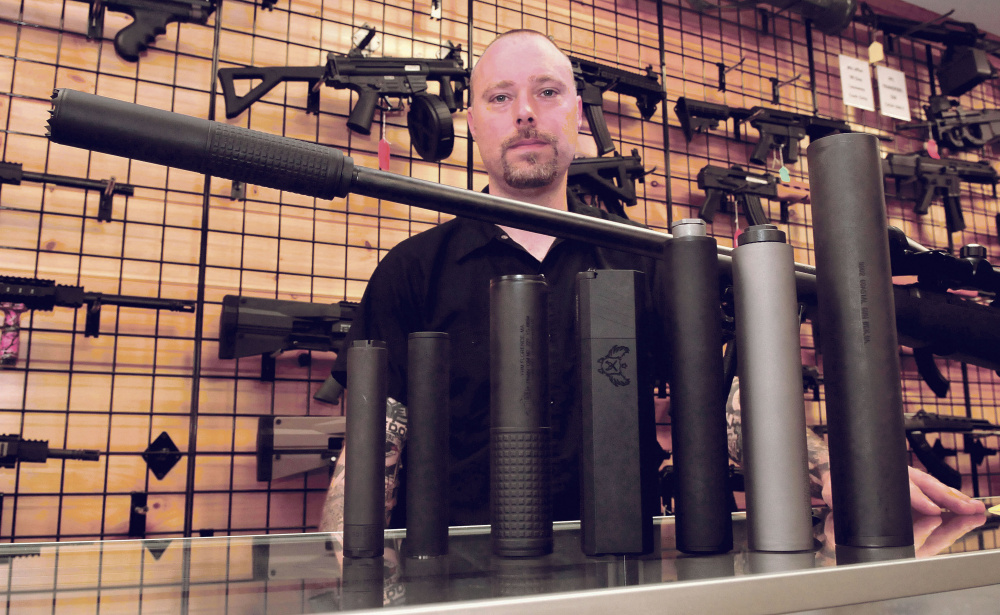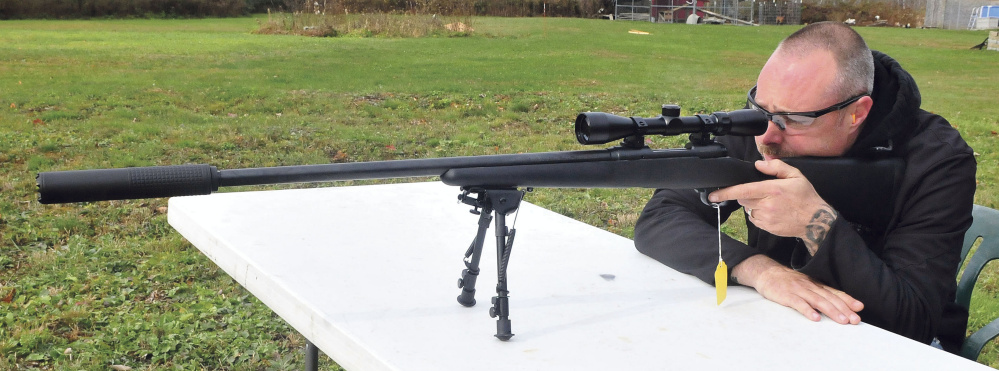Adam Hendsbee loaded a bullet into the .308-caliber Savage hunting rifle and leveled his eye with the gun’s scope.
He turned the safety mechanism off, and a few seconds later a shot echoed through his backyard.
Hendsbee unscrewed the Yankee Hill Machine Phantom, a silencer on the end of the gun. He set up and fired again. This time, a louder, more piercing shot rang through the air.
The difference between the two shots is noticeable — the first taken with a silencer, also called a suppressor, attached to the barrel and the second without one. But according to Hendsbee, the owner of Fairfield gun shop A&G Shooting and Supply, both shots are loud enough to let people in the area know a gun has gone off.
At the shop in Fairfield, Hendsbee said he’s seen an increase this month in silencer sales, something he attributes to a new state law that allows their use on hunting rifles.
“I think it’s a great thing,” Hendsbee said.
Augusta police Chief Robert Gregoire, however, has a different take. He’s never approved a permit for a silencer, though the new law takes away that option and requires permits be signed unless the applicant is prohibited by law for some reason.
Gregoire, who is also a hunter, said he doesn’t see a need for silencers in the community and that’s why he has refused to sign applications in the past. “There are always concerns they’ll fall into the wrong hands,” he said.
The law went into effect in time for the beginning of the firearms season this fall. Saturday was the beginning of the deer rifle season for Maine residents, and non-residents can start Monday.
Gun safety advocates, local police and the Maine Warden Service have concerns about the use of silencers while hunting. Critics say the silencers may lead to more hunting close to homes and other illegal practices, such as hunting out of season or outside legal hours. Even so, there has been little public outcry or resistance from those critics to the law, including from the Maine Warden Service, which testified against it during the legislative process.
Two members of the Joint Committee on Inland Fisheries and Wildlife, which conducted the public hearing on the bill — Chairman Paul Davis, R-Sangerville, and member Dale Crafts, R-Lisbon Falls — are on the board of the Sportsman’s Alliance of Maine, which supported the legislation.
The law was sponsored by Maine Senate Majority Leader Garrett Mason, R-Lisbon Falls, went into effect Oct. 15 and has been approved on a trial basis until 2018.
It comes at a time when federal lawmakers are considering a similar Hearing Protection Act that would loosen regulations on silencers and as Maine is also relaxing some gun laws. In June, Maine became the sixth state across the country to allow gun owners over the age of 21 to carry a concealed weapon without a permit.
Mason did not respond to repeated requests for comment this week on the suppressor law.
SILENCERS ON THE RISE
As of February, there were 2,061 silencers registered in Maine, according to the most recent data available from the U.S. Bureau of Alcohol, Tobacco, Firearms and Explosives. That’s up from 1,728 in March 2014.
Possessing a silencer is legal in 41 states, and they can be used for hunting in 37 states, according to the American Suppressor Association.
In addition to a background check and $200 federal tax, a person who buys a silencer must be fingerprinted and his or her registration signed off by a local law enforcement chief.
To hunt with a silencer in Maine, there’s also a special permit that the Maine Warden Service requires, which costs $12.
The Fairfield shop normally sells three to four silencers a month at a cost of $600 to $800 each on average, Hendsbee said. The shop sold 24 in the month of October.
“We’ve seen a pretty good uptick because of the law,” he said. “It’s still a major investment of time and money though, because they’re highly regulated. It’s not something where people come in, it’s a cash sale and they’re out the door.”
Because selling silencers requires a Class 3 Federal Firearms License, only some gun shops in Maine sell them. Federal firearms licenses are issued to dealers through the Department of Alcohol, Tobacco and Firearms and require a lengthy background check that includes fingerprinting and photographs and an application fee that can be as high as $3,000, depending on what is being sold.
Chris Jordan, owner of G3 Firearms in Turner, said he’s also seen an increase in people looking to buy silencers, but not a major one.
“It’s quite a lengthy investment in time and money to get one,” Jordan said. “There’s a lot of work behind getting it, so while there has been an increase, it’s not like people are knocking down the door to buy silencers.”
SAFETY CONCERNS
Each year the Maine Warden Service convicts an average of 40 or more people for discharging firearms too close to homes, according to testimony offered by the Maine Department of Inland Fisheries and Wildlife at a hearing on the suppressor bill before the Joint Standing Committee on Inland Fisheries and Wildlife in April.
Concerns about hunting too close to homes and an increase in illegal hunting activity, such as exceeding bag limits and night hunting, are among the department’s concerns with the new law, according to the testimony.
“Generally, discharge of a firearm causes a loud report that all in the immediate area can hear,” said Capt. Shon Theriault of the Maine Warden Service, which is a division of the IF&W. “This cautions those in the area, which can prevent possible safety issues. It also alerts landowners that hunters are present on their property.”
A national anti-gun violence group, the Coalition to Stop Gun Violence, has spoken out against similar laws in other states, though was not part of the public opposition in Maine, saying the efforts are a push by the NRA to sell more products and accessories.
“The safety concerns should be obvious to anyone,” Ladd Everitt, spokesman for the coalition, said in an interview. “When someone is engaged in recreational shooting, whether it’s recreational shooting or target shooting, you want people in the vicinity of that shooter to be able to hear the report of a firearm. It’s the same principle as wearing a bright orange vest.”
Proponents of the law say that silencers reduce noise complaints from neighbors and increase accuracy and safety. They say the requirements to get a silencer are a deterrent to many people and that background checks and cost provide enough regulation.
HEARING PROTECTION
Most proponents of silencers tout the benefits to hunters’ hearing health as the biggest advantage.
Sportsman’s Alliance Executive Director David Trahan said suppressors reduce noise and “keep the community peace,” as hunting becomes more common in populated areas. But they also offer protection for hunters with hearing issues, he said.
“(Earplugs) are an option for someone who can’t go through the process or afford it, but when I’m out in the woods, a major part of the hunting experience is taking in the woods and the sounds of the animals,” Trahan said. “To me it’s important to be able to hear a deer coming or ducks or geese.”
The bill’s sponsor, Mason, also stressed hearing health in his testimony on the bill in April. Silencers “provide many benefits to the shooter, including recoil reduction, improved accuracy, and a reduction in sound to safer levels,” he said. “This sound reduction makes the shooting experience safer for hunters and hunting dogs by reducing the likelihood of noise-induced hearing loss.”
A gunshot from a .308 caliber — a common hunting rifle — is about 150 decibels. A silencer on average reduces that sound by about 30 decibels. Normal conversation is generally considered to be about 60 decibels.
Hendsbee, the gun shop owner, said, “Most people don’t wear hearing protection when they’re hunting, so every time they pull that trigger they’re doing permanent damage to their hearing.”
John Hohenwarter, Maine state liaison for the National Rifle Association, testified at the April hearing that “While suppressors do not eliminate the sound of a firearm, they do reduce the muzzle report of a firearm much in the same way a muffler reduces exhaust noise from a car or truck.”
But Everitt, of the Coalition to Stop Gun Violence, said the hearing protection argument is “idiotic.”
“Does it mean that someone right next to the firearm can’t hear it? Of course not, but it might mean that someone at a distance no longer hears it, and bullets travel a long way,” he said.
“Do they want us to think these things are loudeners? They’re silencers,” he said. “They make the shot harder to hear.”
Gregoire, the Augusta police chief, said ear protection isn’t really an issue while hunting. “When I shoot, I wear hearing protection, not while hunting, but when I sight a rifle and do those kinds of things,” he said.
“When it comes to deer hunting or bear hunting, the one shot — if you take one shot and hopefully you do if you’re monitoring your target — that one shot once a year might not be a problem,” he said. “I just don’t see the rationale in wanting a silencer.”
SILENCE ON THE ISSUE
Despite the concerns by opponents of the law about safety and other issues, there was little opposition seven months ago when it was in committee, and no public outcry as it went into effect.
Thomas Franklin, president of the Maine Gun Safety Coalition, said he could not comment on the law because the organization is focusing its attention on the need for background checks for gun owners, something the new concealed carry law does not include.
Skowhegan Police Chief Don Bolduc said so far the department has not had any hunting-related requests for silencers, and he has bigger concerns with other gun laws.
“As far as the concealed weapon permit law, there are people who applied and were denied and now they can carry. That’s my concern,” Bolduc said.
John MacDonald, spokesman for the Maine Warden Service, said that while the service spoke against the bill in April, it is now charged with upholding it.
“We certainly can’t be opposed to it if it’s a new state law, and we’re not going to pretend it’s not a law,” MacDonald said. “We have to change and move with the flow and enforce this new law that’s been created.”
While the Warden Service is responsible for enforcing hunting laws, other local law enforcement agencies are required to sign off on applications for people seeking silencers.
Most local law enforcement chiefs say they haven’t seen an increase in requests.
There has been a slight increase this year in requests for silencer permits to the Maine State Police, but agency officials say it’s too early to tell whether more people are asking for them because of the law.
Bolduc said the Skowhegan department’s one request for a silencer in the last two years was from a man who wanted to practice shooting targets with his family. “It was a more convenient thing to (have the silencer) than wear ear protection,” Bolduc said.
Somerset County Sheriff Dale Lancaster said his agency had three requests for silencers over the last few years, and they were not related to hunting. In Fairfield, Chief Tom Gould said he has had two requests this year.
In Augusta, Gregoire said he has had just a handful of requests for silencers since he became police chief four years ago — none of which he approved because he “doesn’t see a need for silencers in the community.”
That’s about to change, too. The new law also requires law enforcement to certify the application for the silencer unless the law enforcement agent can cite a specific reason not to.
WILL IT STICK?
Penalties for hunting crimes committed with a silencer — such as poaching — include a $1,000 mandatory fine and revocation of a hunting license for five years on top of whatever the penalty for the hunting crime was. More serious violations committed with a noise suppression device can result in a hunter losing his license permanently and seizure of the firearm and silencer.
Trahan, Sportsman’s Alliance director, said he doesn’t think that having a silencer will change the way hunters hunt.
“In order to hunt, you have to take a safety course, so I suspect that everything that can be done is being done for all firearms,” Trahan said. “I don’t see how a suppressor changes any of that.” Hunter safety courses have been required for first-time hunters since 1986. Those who’ve had a license before then aren’t required to take a course.
MacDonald, of the Warden Service, said the department has adapted to the new law, as well as another new law that eliminates the minimum age for hunting beginning next year.
Maine lawmakers have until August 2018 to decide if the silencer law is one they want to keep.
MacDonald said he can’t say if the new law will spur an increase in hunter-related crimes.
“We just don’t know. We’ll have to evaluate it,” he said. “That’s probably why they put that provision in there because of our concerns with it in our testimony, to give us some amount of time. Should this be a counterproductive law, we can re-evaluate it in 2018.”
Rachel Ohm — 612-2368
Twitter: @rachel_ohm
Send questions/comments to the editors.






Success. Please wait for the page to reload. If the page does not reload within 5 seconds, please refresh the page.
Enter your email and password to access comments.
Hi, to comment on stories you must . This profile is in addition to your subscription and website login.
Already have a commenting profile? .
Invalid username/password.
Please check your email to confirm and complete your registration.
Only subscribers are eligible to post comments. Please subscribe or login first for digital access. Here’s why.
Use the form below to reset your password. When you've submitted your account email, we will send an email with a reset code.